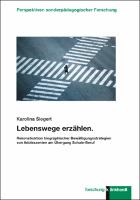Lebenswege erzählen
Rekonstruktion biographischer Bewältigungsstrategien von Adoleszenten am Übergang Schule-Beruf
Abstract
The dissertation is located in the context of research on adolescence and transitions with a focus on special education. Disadvantaged adolescents are the target group of this study. Adolescents were interviewed at two points in time using biographical narrative interviews. In addition, parent interviews took place once, which serve as an addition or contrast, but primarily in order to stress the intergenerational contouring of the life phase of adolescence. The focus of the study is on how adolescents experience and handle the transition from school to post-school life. By using biographical case reconstructions, biographical coping strategies and vocational self-presentations were reconstructed from the narratives in order to illuminate the complexity that such transitions pose. The theoretical framework used in this dissertation understands adolescence as embedded in generational relations, which is also viewed in terms of inequality theory. As a result, the perspective on the adolescent life stage is not only focused on adolescent developmental tasks, but is characterized by an intergenerational view that forms the background for complex and dynamic readjustment processes. Thus, persistent familial significance in this phase of life is emphasized. By reconstructing biographical coping strategies, it becomes visible how young people deal with vocational orientation processes against their familial background and what efforts they partly expend to fulfill familial missions or to distance themselves from them. The research design of the study responds to a desideratum that exists with regard to qualitative or biographical long-term studies in the area of adolescence in school and vocational contexts. The life stories of the adolescents clearly point to the necessity of embedding transitions in an overall biographical context and of reacting to the associated ways of looking at the life phase of adolescence. (DIPF/Orig.) Die vorliegende Studie beleuchtet mit Hilfe eines biographischen Forschungszugangs die Komplexität des Übergangsprozesses von benachteiligten Jugendlichen am Übergang von der Schule ins nachschulische Leben. Entgegen der gängigen Betonung der Ablösung vom Elternhaus wird im Rahmen der Arbeit die anhaltende familiale Bedeutung in der Lebensphase herausgearbeitet. Das Konzept der Entwicklungsaufgaben wird daher intergenerational konturiert und ungleichheitstheoretisch ausgeleuchtet. Die Ergebnisse zeigen, dass die Eltern und ihre (Berufs-)Biographien eine hohe Bedeutung für die eigene Übergangsgestaltung der Adoleszenten haben. Die biographischen Texte illustrieren die jeweiligen Bewältigungs- und Gestaltungsstrategien der Jugendlichen, die Konsequenzen für eine biographieorientierte Beratung am Übergang zulassen. Weiterhin lassen die Erkenntnisse Implikationen für Hochschullehre zu, indem biographieanalytische und ungleichheitstheoretische Aspekte in der Adoleszenzphase im Lehrplan verankert werden. (DIPF/Orig.)
Keywords
Transition; Übergang Schule - Beruf; Benachteiligter Jugendlicher; Familie; Einflussfaktor; Berufsbiografie; Eltern; Adoleszenz; Sonderpädagogik; Sozialer Raum; Übergang; Wahrnehmung; Entscheidung; Bewältigung; Selbstdarstellung; Handlungsfähigkeit; Sozialpädagogik; Entwicklungsaufgabe; Benachteiligung; Sonderpädagogischer Förderbedarf; Förderschule; Sozialer Hintergrund; Forscher; Soziale Herkunft; Generationenverhältnis; Bildungsaspiration; Bourdieu, Pierre; Empirische Untersuchung; Biografische Methode; Biografisches Interview; Fallbeispiel; DeutschlandDOI
10.35468/5878ISBN
9783781524439, 9783781558786, 9783781524439Publisher
Verlag Julius KlinkhardtPublication date and place
Bad Heilbrunn, 2021Series
Perspektiven sonderpädagogischer Forschung,Classification
Educational psychology


 Download
Download Web Shop
Web Shop